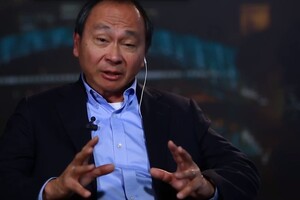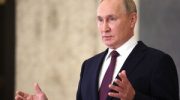According to the American expert, Kyiv's struggle for a successful future did not end in the defeat of the Russian army.

March 10 American economist and professor at Stanford University Francis Fukuyama published an article predicting Russia's defeat in the war against Ukraine. “She attracted a lot of attention in those days, and a lot of people thought I was too optimistic. But the widespread credibility of that article is still quite good. The Russians were indeed defeated in an attempt to seize Kyiv, and in early April they began to leave northern Ukraine, “Fukuyama wrote in a new article for American Purpose.
He recalls that Moscow has greatly reduced its strategic goals by focusing on the east and south. Moscow is trying to conquer the remnants of Luhansk and Donetsk regions, as well as to consolidate control over the destroyed Mariupol. Although the defenders of the Ukrainian city are still holding on after more than 8 weeks of war.
Read also: The Hill: Putin's war has caused an urgent need to expand the US military-industrial base
The common opinion has changed again. It is now generally accepted that the Russians will have better conditions on the plains of southern Ukraine than on the outskirts of Kyiv. In addition, they have appointed a special commander who now leads the operation on one front instead of four at once. Many observers continue to argue that the war will come to a standstill. And to get out of it, the parties will have to agree.
“I am convinced that this is not the case. And the Ukrainians will successfully expel the Russians from the territories they now hold. And there are several reasons for this, “Fukuyama wrote.
First, the United States and its NATO allies have responded to calls by President Volodymyr Zelensky for military assistance. Now they are sending more equipment to the Armed Forces, including long-range artillery, drones and planes, which will deprive Russia of its superiority in firepower. Nobody knows what losses the Ukrainian army suffered. However, according to some estimates, Kyiv may now have even more armored vehicles than Moscow. Therefore, the Russian army no longer has a numerical advantage of 3 to 1, which is usually needed for a successful offensive.
Second, Russian morale is likely to remain extremely low. Russian troops, who left the north of Ukraine, again threw into battle in the Donbass without rest and time to regroup. They lost a large number of men and equipment, and it seems that they lost several more generals in the last week. Ukrainians are even more motivated to win than before, after all the atrocities they saw in Bucha and other liberated cities.
Third, Russia is not yet showing signs of being able to learn and adapt to a changing environment. In particular, its army is still unable to effectively manage joint military operations. Russia still relies on brute force in its advance. The Armed Forces, on the other hand, are characterized by high-quality command at lower levels, while maintaining strategic control over their forces as a whole.
Read also: Fukuyama for CNBC: Ukraine and Russia cannot agree on peace now
Fourth, Russia simply does not have enough people or reserves to replenish forces in the Donbass, which are slowly depleting.
Fukuyama is worried that conservatives in the United States, who initially attacked the Joe Biden administration for not helping Ukraine enough, are now scolding it for doing too much. According to them, Ukraine's success in the east will force Putin to use chemical or biological weapons, and perhaps even a nuclear arsenal. Thus, the Conservatives have united with the “left” pacifists, who use World War III as an argument for not helping Ukraine.
Fukuyama admits that the possibility of escalation cannot be ruled out when potential rates are so high. In the end, the United States and NATO rejected the idea of closing the skies over Ukraine, not wanting to directly attack Russian targets on Russian territory. However, according to Fukuyama, the use of weapons of mass destruction is unlikely. Because a chemical or nuclear strike will not do anything to Russia, whose position is constantly weakening. Instead, it will escalate, leading to much greater NATO intervention in the war. Of course, this does not mean that the answer will be symmetrical. But the alliance has many opportunities to respond to the use of weapons of mass destruction without it. For example, NATO could close the skies over Ukraine or attack bases of Russian chemical or nuclear weapons. This will severely undermine Russia's position.
“If Russia suffers such a defeat in the war against the Ukrainians, imagine what will happen if a NATO country directly intervenes,” Fukuyama wrote.
The political consequences of Russia's unequivocal defeat are not yet felt in Europe. Viktor Orban won the election in Hungary, as did Aleksandar Vucic in Serbia. However, Emmanuel Macron was able to bypass Marin Le Pen in last weekend's election. But Donald Trump's treacherous sympathies for Russia did not seem to affect his position in the Republican Party. However, the war in Ukraine is not over yet.
If this happens in the coming weeks, and Russia is expelled from the territories it occupied after February 24, it will mean that Putin has lost his “new and brilliant” army without any territorial gains. At the same time, his country found itself in the same isolation as the DPRK. Failure of this level will undoubtedly have consequences both for Russia itself and for all populists who support it.
But Ukraine's struggle will not end with Russia's defeat. The blockade of Ukrainian ports in the Black Sea must be broken in order for the country to have an economic future. NATO needs to pay attention to the problem of opening Ukrainian ports and protecting free passage in the waters. This will be just the beginning of the necessary large-scale reconstruction.
Read also: Focus: Russia has too little strength to fight for Donbas
But according to Fukuyama, Ukraine will also have an important opportunity. Before the war, the country's greatest weakness was the oligarchs' dominance over its economy and political system. Since the beginning of the invasion, the internal balance of power has changed dramatically, and some oligarchs fled the country in the first days. Rinat Akhmetov, who comes from Donbass and previously sponsored the pro-Russian Party of Regions, has now seen his Azovstal plant bombed by Russian forces while the Ukrainian military heroically defends its territory. Fukuyama is confident that Ukraine will have a great chance to strengthen its national identity with new symbols and balance of power, as well as break with the corruption addictions that existed in the country until February 24, 2022.
See special topic: The occupiers fired on a hospital in Severodonetsk, killing a woman – the head of the OVA The destruction of the building is significant, several floors were damaged. The Kremlin is threatening to cut off gas to other EU countries It is unknown at this time how many countries have agreed to Russia's payment terms, and whether there are any. International hacker groups are synchronizing their attacks on Russia with Ukraine – Fedorov According to the Minister, most of these activities are not public. Zelensky called for the G20 summit The G20 summit will take place in autumn 2022 in Indonesia. Turkey hopes to meet Zelensky with Putin in the coming days. Podoliak says the date and context have not been determined.


